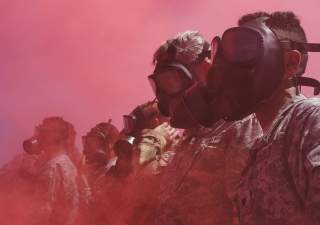Why the World Will Have to Live with a Nuclear-Armed North Korea
Kim Jong-un understands the crucial difference between possessing power and converting it into desired outcomes.
Pyongyang has been equally defiant when the United States and its allies have gone beyond words and staged shows of force. Neither the joint military maneuvers by South Korea, Japan and the United States—or the simulated bombing runs over South Korea by American B-1 Lancer bombers and F-35B stealth fighters in August—rattled North Korea. It upped the ante by firing over Japan a Hwasong-12 missile, which some experts estimate has a 3,700 kilometers (2,299 miles). Moves that Washington, Seoul and Tokyo make to deter Pyongyang, the latter regards as threats that necessitate a countermove. The result? A tit-for-tat that raises the political temperature, but achieves nothing else.
The United States and South Korea certainly have the military wherewithal to launch a preventive attack on North Korea’s nuclear weapons and missiles sites. But Washington and Seoul would, as Kim well knows, have to be sure that Pyongyang won’t react by targeting South Korea and Japan, both of which host American bases and troops, with its surviving armaments. South Korea is especially vulnerable. While American and South Korean strikes (from the air and the ground) could demolish many of the missiles and artillery batteries that Pyongyang has targeted at Seoul, the success rate would have to be very high to avoid substantial carnage in South Korea, especially in greater Seoul, which contains over twenty-five million people.
While Washington and its two regional allies—Japan and South Korea—would certainly use military force if North Korea attacked any one of them first, would they do so in the absence of an attack by Pyongyang and solely to eliminate its nuclear sites? Kim has bet that they will not, and he certainly won’t initiate a war with them and provoke a response that would demolish his state. (Mercurial he is, suicidal he’s not.) What appears to be unadulterated recklessness on his part thus involves some cunning calibration.
China and Russia have, even if inadvertently, bolstered Kim’s military confidence. Though neither can prevent an American attack on North Korea, both have unequivocally opposed such a move and insist on a diplomatic solution. China has gone further. Global Times, a Chinese newspaper known for its hawkish views and connections to officialdom in Beijing, warned Pyongyang that China would not defend it if it started a war but then added a caveat: “If the U.S. and South Korea carry out strikes and try to overthrow the North Korean regime and change the political pattern on the Korean Peninsula, China will prevent them from doing so.” Similarly, the Chinese ambassador to the United Nations, Liu Jieyi, declared that “China will never allow chaos and war on the peninsula.” China and Russia regard North Korea as a nettlesome neighbor, but both want to prevent a major war on their frontier. They also realize that North Korea’s collapse following a war could eventually produce a unified Korean Peninsula allied to the United States, and neither, especially China, deems that outcome acceptable.
There’s a fourth thing we know about North Korea. Like other states (India and Pakistan) that, despite economic sanctions and political condemnations, were determined to build nuclear weapons and long-range ballistic missiles capable of delivering them, it has figured out how to do so. Moreover, North Korea’s advance toward an operational nuclear capability has proved much faster than experts had assumed. The recent milestones include its successful test of the two-stage Hwasong-14 intercontinental ballistic missile in July 2017 and, in September, a hydrogen bomb with an estimated yield of 120 kilotons or even 160 kilotons—ten times that of the American bomb dropped on Hiroshima in 1945 and the one North Korea tested last September. (Some experts believe the latest detonation may have been a boosted fission device rather than a two-stage thermonuclear one; but even if they are right, Pyongyang’s path to a hydrogen bomb won’t be a long one.) North Korea must still overcome technical hurdles, such as reducing the payload of its warheads and preventing their destruction by the searing heat and vibration they will encounter upon reentering the Earth’s atmosphere. But given its achievements so far it would be surprising if it failed to find solutions.
The upshot, based on the four things we know for sure about North Korea, is that short of a preventive strike—which would almost certainly initiate a chain of events that would kill many thousands of people in North and South Korea—there’s nothing that Washington can do to prevent it from deploying nuclear weapons, which one day will be able to target parts of the United States. The question now is how best to manage a nuclear North Korea.
Rajan Menon is an Anne and Bernard Spitzer Professor of International Relations at the Powell School, City College of New York/City University of New York. He is also a senior research scholar at Columbia University’s Saltzman Institute of War and Peace Studies, and author of The Conceit of Humanitarian Intervention.

